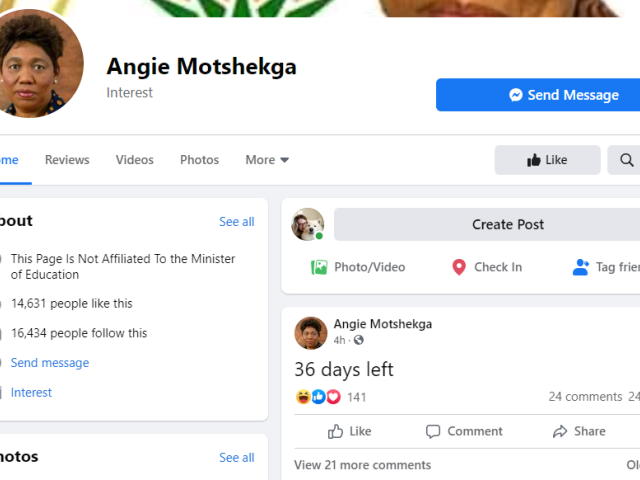Does WhatsApp Gold ring a bell? It’s the old claim that a new, enhanced version of the popular messaging app is available. But it is actually malware.
What about the aphelion phenomenon, when Earth is at its furthest from the sun, resulting in colder than usual weather?
And you must have heard about poisoned bottled water from the Dew brand?
At Africa Check, we call all these zombie claims. From bogus home remedies to unfounded hacking warnings, zombie claims are those that just won’t die, despite having been debunked before.
Zombie claims make the rounds for several years, across multiple social media platforms. They usually remain the same copy-pasted version or graphic.
For example, the same claim about “killer biscuits” called crunches has been circulating on social media since 2016, complete with the same photos.
Other claims change slightly as they are forwarded, or take two old hoaxes and mash them together to make a new one.
For example, our WhatsApp line recently received a graphic that took the WhatsApp Gold malware claim and combined it with a claim about a virus-laden video called “dance of the pope”. This is a tactic used to make old hoaxes seem new.
Africa Check has debunked our fair share of zombie claims, but this time we’ve got tips on how you can spot and avoid recycled hoaxes.
1. Look for the paper trail that leads you straight to the facts
Zombie claims tend to leave a paper trail, as they are often debunked by fact-checking organisations. A quick Google search of the claim should take you straight to the facts.
Take the old claim that typing your PIN backwards will alert the police if you’re robbed at an ATM. If you Google the phrase “type pin backwards”, you will find a long trail of different fact-checks, including Africa Check’s debunk.
For claims that change slightly over the years, use keywords. Often the premise of the claim will remain the same but some small details will change.
For example, in July 2020, Africa Check debunked a post warning that a video called “Argentina is doing it” claimed to show a flattening of the coronavirus curve in Argentina, but instead hacked your phone in 10 seconds. We found this post to be false.
Three months later, in October 2020, FullFact debunked the same claim, but this time the video was called “India is doing it”.
In this case, Googling keywords such as “covid video hack” would bring up multiple fact-checks of both versions of the claim.
PRO TIP: Check whether the details of the story match up by visiting many credible news organisations or fact-checking websites. If the claim hasn’t been reported by a major news outlet, it's a red flag that it’s not true.
2. Check the credibility and reputation of the source
When vetting information that might have been recirculated, it’s important to check the credibility of the source.
Widely shared posts often claim to be from a trusted source but don’t provide any proof. For example, the viral and often debunked message that thieves are using the disinfectant fluid Jeyes Fluid to make explosives is signed off by a “Kol. Cor Snel” from Pretoria in South Africa and includes a telephone number.
In debunking the claim, Africa Check tried to call the number listed at the bottom of the message, but it didn’t exist.
Other social media posts which have been circulating for months claim to show evidence through photoshopped news articles or fake news websites.
Always use trusted news organisations, fact-checking websites and official government sources.
Read more about trusted sources in our guide on how to tell if a news article is reliable.
PRO TIP: Be wary of information shared on social media without evidence, especially if it has been forwarded many times. It can be easily manipulated.
3. Be skeptical of claims that make you angry
A telltale sign of a hoax is the presence of emotional manipulation: does the post make you angry, sad or anxious? Also look out for inconsistencies, or sensational language which often drives extreme emotions.
One claim we have seen time and time again is a message warning people to be wary of potential robbers posing as officials from the government’s department of home affairs
The claim uses sensational language such as “high security alert”, “beware” and “alert your friends and family” to manipulate readers into sharing the message.
Similar claims about crime and violence often use sensational language mixed with inconsistencies, such as providing no evidence or proof for the warnings.
PRO TIP: Hoaxes that play on people's fears or desires are often shared widely. Watch out for claims that seem too shocking to be true – they usually aren’t.
4. Beware of old claims disguised as recent events
Paying attention to the date of publication or posting will help you spot zombie claims. These often resurface from years ago and are presented as recent events.
In March 2023, the Economic Freedom Fighters, South Africa’s second-largest opposition party, took to the streets in what they called a “#NationalShutdown” protest.
During the protest, many videos and photos were shared on social media claiming to show what was happening. But Africa Check found that some of the footage was old and unrelated to the protest.
If it’s not clear when an image is from, a Google reverse image search can be useful. It can help you check when a photo or video was originally published online and whether it comes from a credible source.
Our geolocation guide can also help you spot images and videos that have been used out of context.
PRO TIP: Making sure that the information you receive is up to date can help you keep ahead of resurfacing claims.
5. Stay informed to gain the upper hand
As governments introduced measures to combat the economic effects of the coronavirus pandemic, Africa Check began to see a number of scams and claims around social grants. Despite having been debunked, we continued to receive these claims.
A good tactic for spotting these types of false claims is to stay informed by knowing where to find reliable information. In the case of social grants, a good place to start would be to look for information on official government websites.
When it comes to recurring health claims, such as bogus medical cures and home remedies, a quick visit to the website of public health organisations such as the World Health Organization will help you find expert health advice.
Staying abreast of misinformation techniques is also a good way to avoid falling for old hoaxes. You’ll be better equipped to spot zombie claims if you familiarise yourself with common patterns. Posts that are poorly written, ask for money, or link to an unrelated website should immediately raise your suspicions.
PRO TIP: Taking the time to check and verify facts can help you avoid being misled. Sign up to our fact-packed newsletter to stay one step ahead of hoaxes.





Add new comment